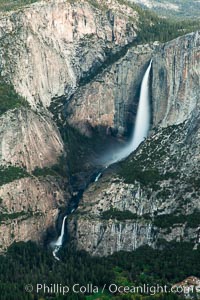
Yosemite Falls viewed from Glacier Point, spring.
Location: Yosemite Falls, Yosemite National Park, California
Image ID: 27740
Location: Yosemite Falls, Yosemite National Park, California
Image ID: 27740
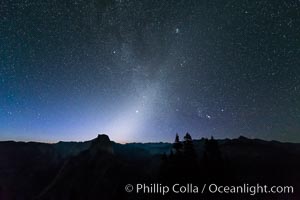
Zodiacal Light and planet Jupiter in the northeastern horizon, above Half Dome and the Yosemite high country.
Location: Glacier Point, Yosemite National Park, California
Image ID: 28743
Location: Glacier Point, Yosemite National Park, California
Image ID: 28743
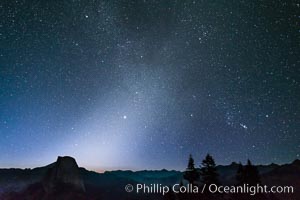
Zodiacal Light and planet Jupiter in the northeastern horizon, above Half Dome and the Yosemite high country.
Location: Glacier Point, Yosemite National Park, California
Image ID: 28744
Location: Glacier Point, Yosemite National Park, California
Image ID: 28744
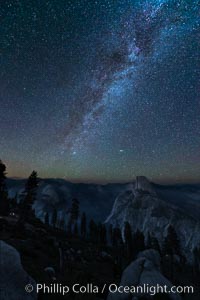
Perseid Meteor Shower and Milky Way, over Half Dome and Yosemite National Park.
Location: Glacier Point, Yosemite National Park, California
Image ID: 28747
Location: Glacier Point, Yosemite National Park, California
Image ID: 28747
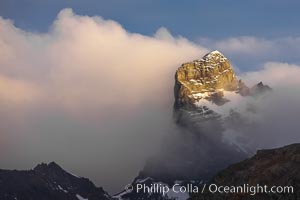
South Georgia Island, spire and sunset clouds, showing the island's characteristic rugged topography. 56% of the island is covered by 161 glaciers, which have created numerous large bays and inlets that provide excellent habitat for marine animals and seabirds. Mountains meet the sea in steep-sided seacliffs covered with sparse vegetation. The highest point on South Georgia Island is Mt. Paget at 2,915m.
Location: Right Whale Bay, South Georgia Island
Image ID: 24328
Location: Right Whale Bay, South Georgia Island
Image ID: 24328
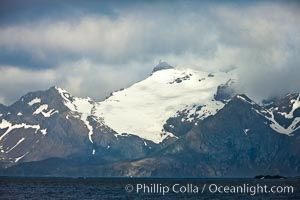
South Georgia Island coastline, showing the island's characteristic rugged topography. 56% of the island is covered by 161 glaciers, which have created numerous large bays and inlets that provide excellent habitat for marine animals and seabirds. Mountains meet the sea in steep-sided seacliffs covered with sparse vegetation. The highest point on South Georgia Island is Mt. Paget at 2,915m.
Location: South Georgia Island
Image ID: 24342
Location: South Georgia Island
Image ID: 24342
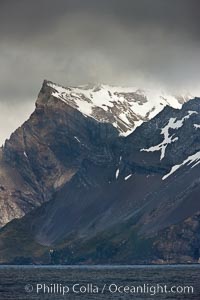
South Georgia Island coastline, showing the island's characteristic rugged topography. 56% of the island is covered by 161 glaciers, which have created numerous large bays and inlets that provide excellent habitat for marine animals and seabirds. Mountains meet the sea in steep-sided seacliffs covered with sparse vegetation. The highest point on South Georgia Island is Mt. Paget at 2,915m.
Location: South Georgia Island
Image ID: 24343
Location: South Georgia Island
Image ID: 24343
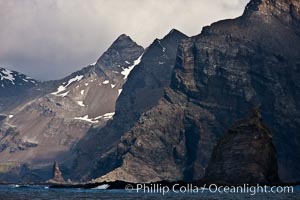
South Georgia Island coastline, showing the island's characteristic rugged topography. 56% of the island is covered by 161 glaciers, which have created numerous large bays and inlets that provide excellent habitat for marine animals and seabirds. Mountains meet the sea in steep-sided seacliffs covered with sparse vegetation. The highest point on South Georgia Island is Mt. Paget at 2,915m.
Location: South Georgia Island
Image ID: 24359
Location: South Georgia Island
Image ID: 24359
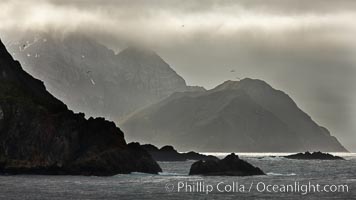
South Georgia Island coastline, showing the island's characteristic rugged topography. 56% of the island is covered by 161 glaciers, which have created numerous large bays and inlets that provide excellent habitat for marine animals and seabirds. Mountains meet the sea in steep-sided seacliffs covered with sparse vegetation. The highest point on South Georgia Island is Mt. Paget at 2,915m.
Location: South Georgia Island
Image ID: 24363
Location: South Georgia Island
Image ID: 24363
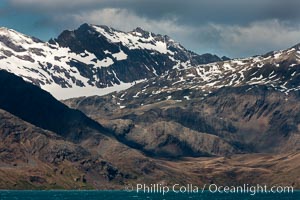
Mountains, glaciers and ocean, the rugged and beautiful topography of South Georgia Island.
Location: Grytviken, South Georgia Island
Image ID: 24389
Location: Grytviken, South Georgia Island
Image ID: 24389
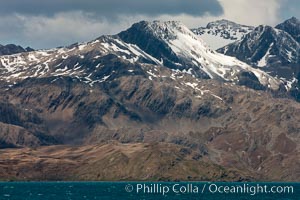
Mountains, glaciers and ocean, the rugged and beautiful topography of South Georgia Island.
Location: Grytviken, South Georgia Island
Image ID: 24549
Location: Grytviken, South Georgia Island
Image ID: 24549
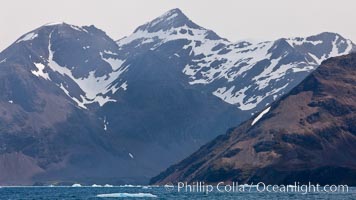
Mountains, glaciers and ocean, the rugged and beautiful topography of South Georgia Island.
Location: Grytviken, South Georgia Island
Image ID: 24550
Location: Grytviken, South Georgia Island
Image ID: 24550
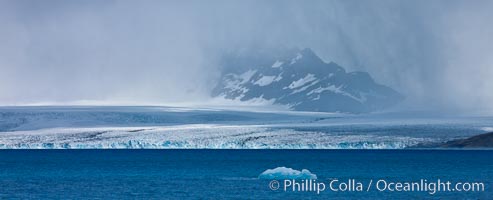
Glacier and iceberg, Cumberland Bay, near Grytviken.
Location: Grytviken, South Georgia Island
Image ID: 24551
Location: Grytviken, South Georgia Island
Image ID: 24551
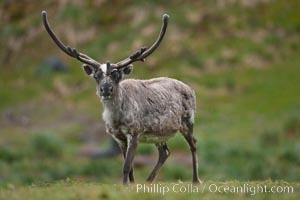
Reindeer on South Georgia Island. Reindeer (known as caribou when wild) were introduced to South Georgia Island by Norway in the early 20th Century. There are now two distinct herds which are permanently separated by glaciers.
Species: Reindeer, Rangifer tarandus
Location: Fortuna Bay, South Georgia Island
Image ID: 24679
Species: Reindeer, Rangifer tarandus
Location: Fortuna Bay, South Georgia Island
Image ID: 24679
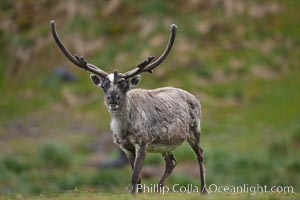
Reindeer on South Georgia Island. Reindeer (known as caribou when wild) were introduced to South Georgia Island by Norway in the early 20th Century. There are now two distinct herds which are permanently separated by glaciers.
Species: Reindeer, Rangifer tarandus
Location: Fortuna Bay, South Georgia Island
Image ID: 24680
Species: Reindeer, Rangifer tarandus
Location: Fortuna Bay, South Georgia Island
Image ID: 24680
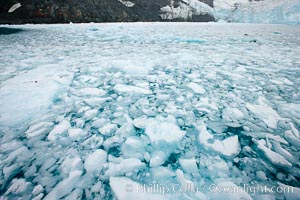
Drygalski Fjord, packed with brash ice which has broken away from Risting Glacier at the end of the narrow fjord.
Location: Drygalski Fjord, South Georgia Island
Image ID: 24740
Location: Drygalski Fjord, South Georgia Island
Image ID: 24740
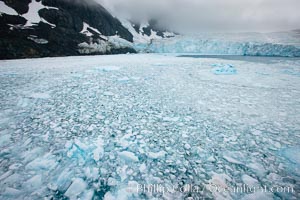
Drygalski Fjord, packed with brash ice which has broken away from the glacier at the end of the narrow fjord.
Location: Drygalski Fjord, South Georgia Island
Image ID: 24741
Location: Drygalski Fjord, South Georgia Island
Image ID: 24741
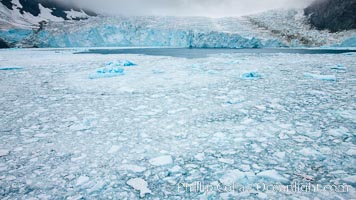
Drygalski Fjord, packed with brash ice which has broken away from the glacier at the end of the narrow fjord.
Location: Drygalski Fjord, South Georgia Island
Image ID: 24742
Location: Drygalski Fjord, South Georgia Island
Image ID: 24742
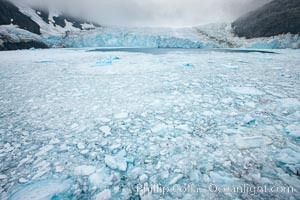
Drygalski Fjord, packed with brash ice which has broken away from Risting Glacier at the end of the narrow fjord.
Location: Drygalski Fjord, South Georgia Island
Image ID: 24743
Location: Drygalski Fjord, South Georgia Island
Image ID: 24743
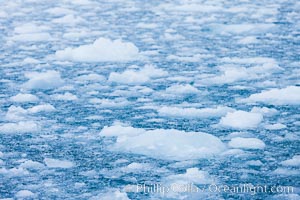
Brash ice and pack ice in Antarctica. Brash ices fills the ocean waters of Cierva Cove on the Antarctic Peninsula. The ice is a mix of sea ice that has floated near shore on the tide and chunks of ice that have fallen into the water from nearby land-bound glaciers.
Location: Cierva Cove, Antarctic Peninsula, Antarctica
Image ID: 25527
Location: Cierva Cove, Antarctic Peninsula, Antarctica
Image ID: 25527
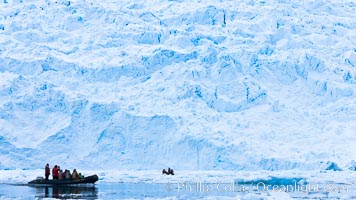
Zodiac cruising in Antarctica. Tourists enjoy the pack ice and towering glaciers of Cierva Cove on the Antarctic Peninsula.
Location: Cierva Cove, Antarctic Peninsula, Antarctica
Image ID: 25590
Location: Cierva Cove, Antarctic Peninsula, Antarctica
Image ID: 25590
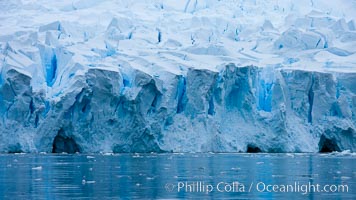
A glacier fractures and cracks, as the leading of a glacier fractures and cracks as it reaches the ocean. The pieces will float away to become icebergs.
Location: Neko Harbor, Antarctic Peninsula, Antarctica
Image ID: 25671
Location: Neko Harbor, Antarctic Peninsula, Antarctica
Image ID: 25671
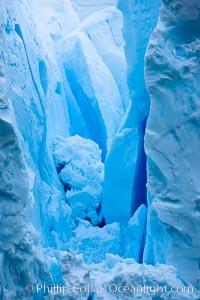
A glacier fractures and cracks, as the leading of a glacier fractures and cracks as it reaches the ocean. The pieces will float away to become icebergs.
Location: Neko Harbor, Antarctic Peninsula, Antarctica
Image ID: 25738
Location: Neko Harbor, Antarctic Peninsula, Antarctica
Image ID: 25738
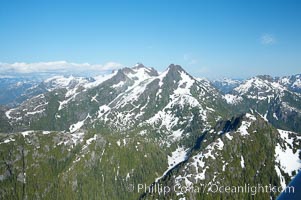
Mariner Mountain, viewed from the northwest, on the west coast of Vancouver Island, British Columbia, Canada, part of Strathcona Provincial Park, located 36 km (22 mi) north of Tofino. It is 1,771 m (5,810 ft) high, snow covered year-round and home to several glaciers.
Location: Mariner Mountain, Strathcona Provincial Park, British Columbia, Canada
Image ID: 21071
Location: Mariner Mountain, Strathcona Provincial Park, British Columbia, Canada
Image ID: 21071
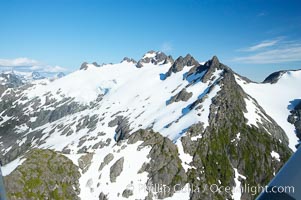
Mariner Mountain, viewed from the northwest, on the west coast of Vancouver Island, British Columbia, Canada, part of Strathcona Provincial Park, located 36 km (22 mi) north of Tofino. It is 1,771 m (5,810 ft) high, snow covered year-round and home to several glaciers.
Location: Mariner Mountain, Strathcona Provincial Park, British Columbia, Canada
Image ID: 21085
Location: Mariner Mountain, Strathcona Provincial Park, British Columbia, Canada
Image ID: 21085
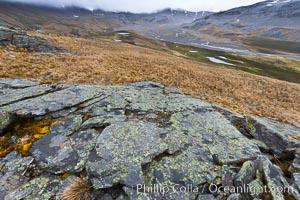
Grassy windy highlands and rocks, overlooking alluvial floodplain formed by glacier runoff near Stromness Bay.
Location: Stromness Harbour, South Georgia Island
Image ID: 24610
Location: Stromness Harbour, South Georgia Island
Image ID: 24610
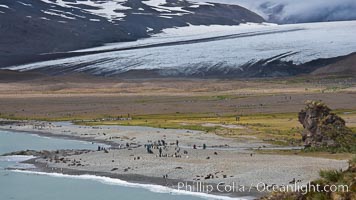
Glacier, beach, king penguins and antarctic fur seals.
Location: Fortuna Bay, South Georgia Island
Image ID: 24614
Location: Fortuna Bay, South Georgia Island
Image ID: 24614

Drygalski Fjord, packed with brash ice which has broken away from the glacier at the end of the narrow fjord.
Location: Drygalski Fjord, South Georgia Island
Image ID: 24744
Location: Drygalski Fjord, South Georgia Island
Image ID: 24744

Zodiac cruising in Antarctica. Tourists enjoy the pack ice and towering glaciers of Cierva Cove on the Antarctic Peninsula.
Location: Cierva Cove, Antarctic Peninsula, Antarctica
Image ID: 25562
Location: Cierva Cove, Antarctic Peninsula, Antarctica
Image ID: 25562

Brash ice and pack ice in Antarctica. Brash ices fills the ocean waters of Cierva Cove on the Antarctic Peninsula. The ice is a mix of sea ice that has floated near shore on the tide and chunks of ice that have fallen into the water from nearby land-bound glaciers.
Location: Cierva Cove, Antarctic Peninsula, Antarctica
Image ID: 25589
Location: Cierva Cove, Antarctic Peninsula, Antarctica
Image ID: 25589